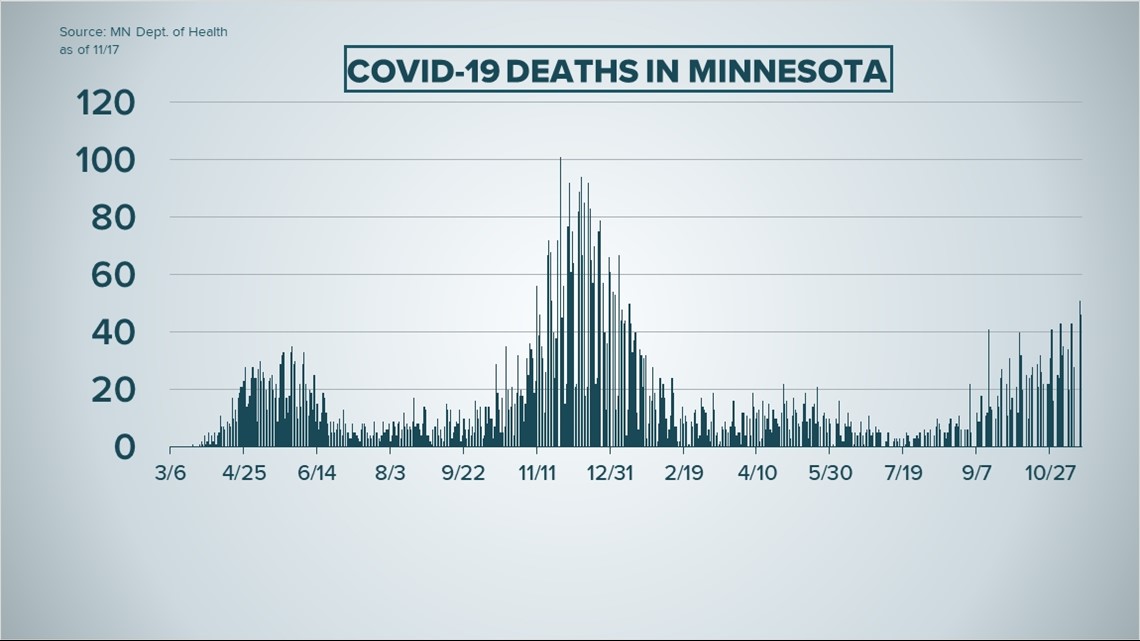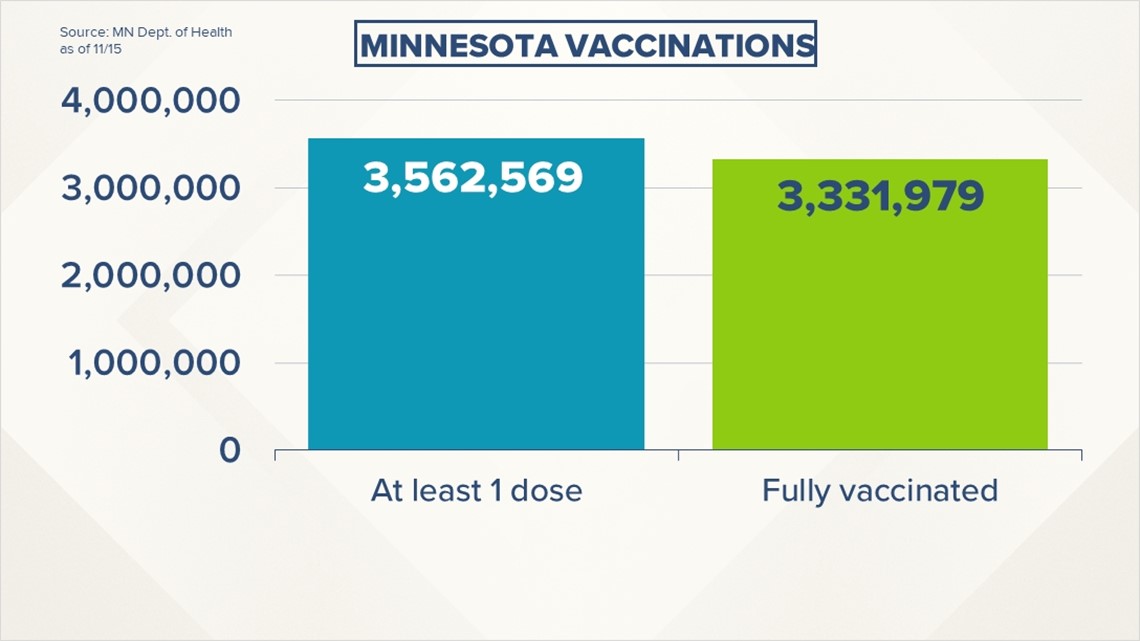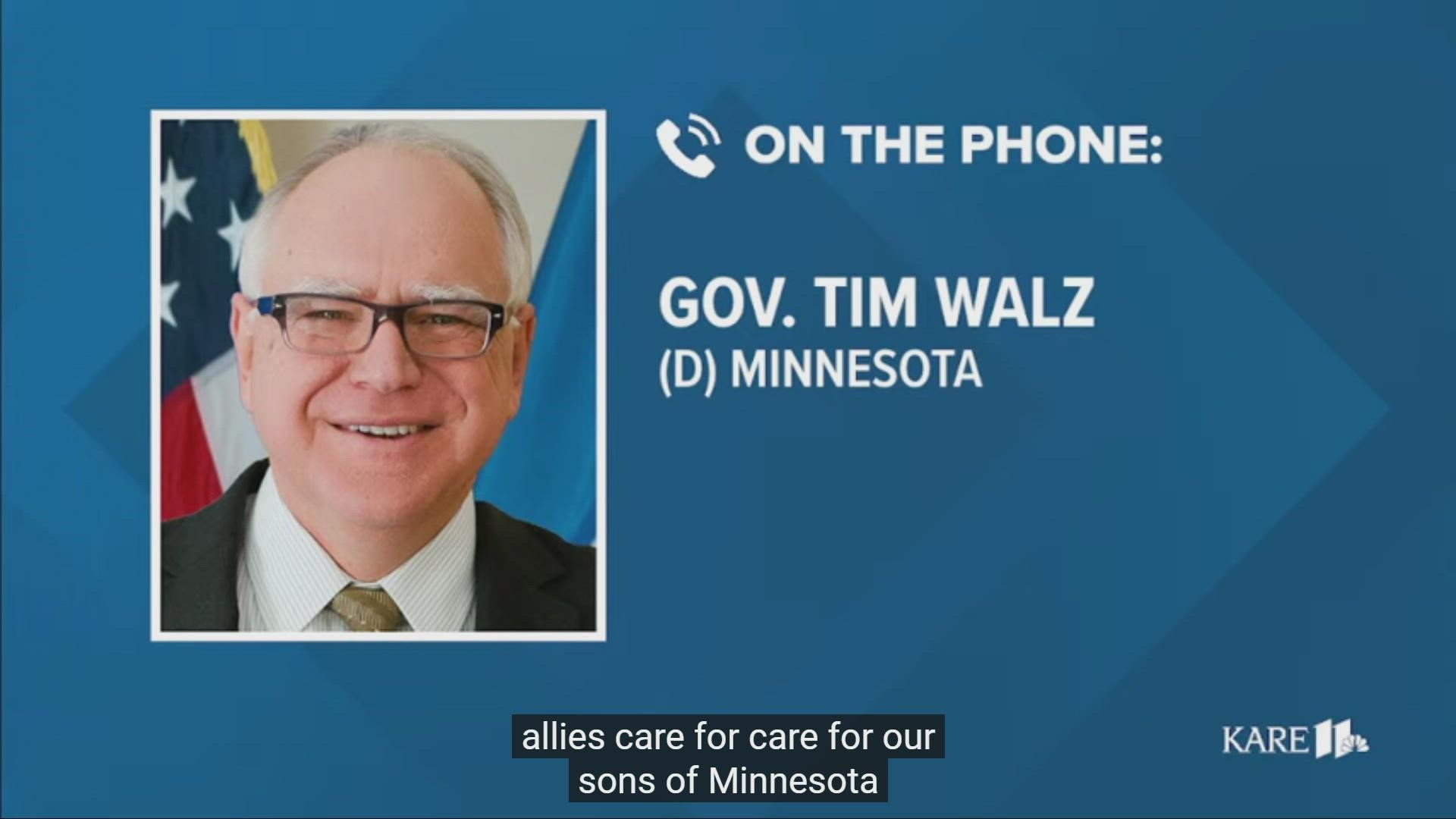ST PAUL, Minn. — Wednesday, Nov. 17
- Federal emergency medical teams to assist Minnesota hospitals
- Minnesota expanding COVID booster eligibility this week
- Growing number of educators leaving jobs because of the pandemic
- CDC data: Minnesota leads the nation in new COVID-19 cases based on population
11 a.m.
The Minnesota Department of Health reported another 3,457 new COVID-19 cases Wednesday as the state continues to battle an ongoing coronavirus surge tied to the highly-transmissible delta variant.
The additional cases bring the state's total since the pandemic began to
861,235, including reinfections.
Another 46 deaths were also reported by MDH Wednesday, three of which were among people in their 40s. In total, 9,093 Minnesotans have died of COVID-19.


Hospitalizations increased slightly from Tuesday, with 1,382 people needing care. Of those patients, 320 are currently in the ICU and 1,062 people are in non-ICU beds. On Tuesday, MDH reported 1,348 people were hospitalized.
That's the highest number of daily COVID hospitalizations since Dec. 11, 2020, when 1,406 were reported.
Statewide, only 46 ICU beds are currently open to receive patients. Across the metro system, there are only nine ICU and 17 non-ICU beds available.
MDH says 7,430,246 vaccine doses have been administered in the state so far, with 3,562,569 people ages 5 and up having received at least one dose, or 68.4% of that population.


Of the more than half a million children ages 5-11 in Minnesota, so far 55,939 have at least one dose of their COVID vaccine.
10 a.m.
As Minnesota hospitals feel the strain of the current COVID-19 surge, the federal government is sending dozens of medical personnel to help treat patients and support local staff.
Gov. Tim Walz announced Wednesday that with help from Sen. Amy Klobuchar his request for emergency staffing assistance was granted, and two Department of Defense medical teams of 22 people each will arrive at HCMC Minneapolis and St. Cloud Hospital next week.
Gov. Walz has also arranged to open bed space in long-term care facilities across the state to alleviate pressure on hospitals. Starting Monday, the governor's office said a third skilled-nursing facility will open for certain patients from Twin Cities hospitals that no longer need hospital-level care but aren't ready to go home.
Tuesday, Nov. 16
2 p.m.
Minnesota Department of Health Commissioner Jan Malcolm said the state of Minnesota is preparing to expand COVID-19 vaccine booster shot eligibility to all adults as soon as this week, with or without the federal government.
"Given the very serious circumstances here in Minnesota ... we're preparing to move ahead independently this week to expand booster eligibility if there is no action at the federal level, which we definitely hope there will be this week." Malcolm said.
Currently, the CDC says Americans are eligible for a booster if they are 65 or older, have underlying medical conditions, work in high-risk or long-term care settings, and for anyone who received the single-dose Johnson and Johnson vaccine.
Malcolm said there is growing support for expanded booster eligibility at the federal level, however she said Minnesotans can't wait.
11 a.m.
The Minnesota Department of Health (MDH) announced Tuesday that the number of COVID-19 cases in the state has increased by 10,913 over the weekend. MDH no longer shares data on weekends, so numbers released on Tuesdays reflect reports from 4 a.m. Friday to 4 a.m. Monday.
The cumulative total cases (including reinfections) in Minnesota is now at 857,791 since the start of the pandemic.
Fifty-one people died, bringing the cumulative COVID-19 death total to 9,047. The number reported Tuesday includes deaths from Thursday (Veterans Day) as no fatality numbers were collected on the holiday.
According to MDH's latest data available, 1,348 people are being treated for COVID in hospitals around the state, with 1,041 in non-ICU beds and 307 in the ICU.
MDH says 7,394,003 total doses of vaccine have been administered in the state, with 3,548,912 people age 5 and older having received at least one shot (68.1%). Of that number 3,330,128 people have completed their COVID series and are considered completely vaccinated (63.9%).

